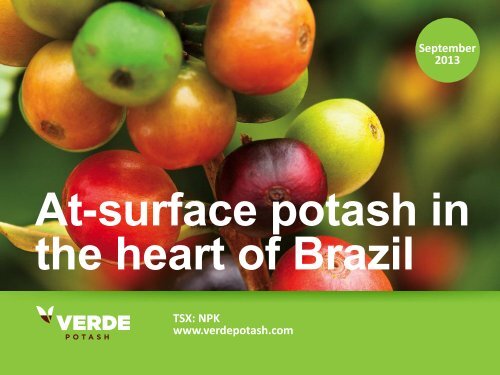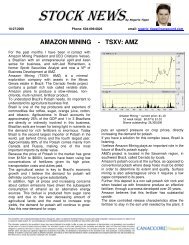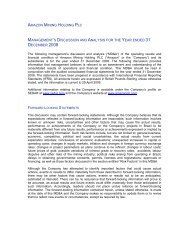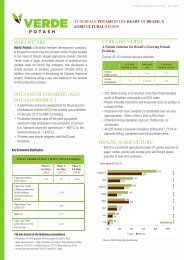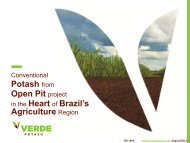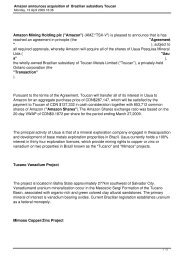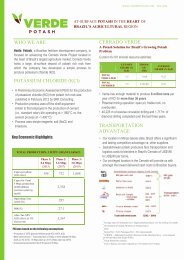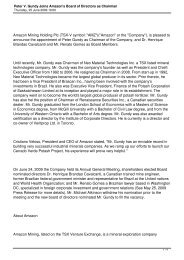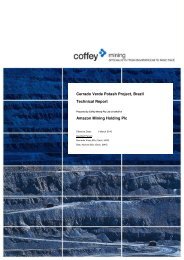Verde fertilizantes - Verde Potash Plc
Verde fertilizantes - Verde Potash Plc
Verde fertilizantes - Verde Potash Plc
Create successful ePaper yourself
Turn your PDF publications into a flip-book with our unique Google optimized e-Paper software.
September<br />
2013<br />
At-surface potash in<br />
the heart of Brazil<br />
TSX: NPK<br />
www.verdepotash.com
Disclaimer<br />
This presentation contains certain forward-looking information, which includes but is not limited to, statements with respect to the<br />
Company’s new strategy, the commercial production of Thermo<strong>Potash</strong> and KCl, design and building of a Flex Plant, timing and<br />
completion of a prefeasibility study, receipt of environmental permits, and the generation of cash flow from Phase 1 of the new<br />
strategy. Forward-looking information involves known and unknown risks, uncertainties and other factors which may cause actual<br />
results, performance or achievements of the Company to differ materially from the forward-looking information. Material risk factors<br />
that could cause actual results to differ materially from such forward-looking information include, but are not limited to, the failure to<br />
obtain necessary regulatory approvals, risks associated with the mining industry in general (e.g., operational risks in development,<br />
exploration and production; delays or changes in plans with respect to exploration or development projects or capital expenditures;<br />
the uncertainty of estimates and projections relating to production, costs and expenses, and health, safety and environmental risks),<br />
commodity price, demand for Thermo<strong>Potash</strong> and KCl in Brazil, exchange rate fluctuations and other risk factors set out in the<br />
Company’s most recently filed Annual Information Form under the heading “Risk Factors”. Currently, Thermo<strong>Potash</strong> is not<br />
commercially produced or sold in Brazil. As a consequence, there is no current market for this product. Should commercial demand<br />
for Thermo<strong>Potash</strong> fail to develop, the Company’s business model may not be appropriate. Accordingly, readers should not place<br />
undue reliance on such forward-looking information. Material factors or assumptions used to develop such forward-looking<br />
information include, but are not limited to, the demand for Thermo<strong>Potash</strong> and KCl in Brazil, the ability to secure necessary<br />
environmental and mining permits, the ability to secure financing, and other assumptions set out in the Company’s current technical<br />
report. The Company does not currently intend to update forward-looking information in this news release except where required by<br />
law.<br />
2<br />
Total resources include all categories unless otherwise stated. The grades detailed in this presentation are conceptual in nature.<br />
There has been insufficient exploration to define a mineral reserve. Should the company engage in further exploration, it is uncertain<br />
that it will result in the targets being delineated as a mineral reserve. Readers are cautioned not to rely solely on the summary of<br />
such information contained in this presentation and are directed to complete information posted on <strong>Verde</strong>’s website<br />
(www.verdepotash.com) and filed on SEDAR (www.sedar.com) and any future amendments to such. Readers are also directed to<br />
the cautionary notices and disclaimers contained herein. Potential investors should conduct their own investigations as to the<br />
suitability of investing in securities of <strong>Verde</strong> <strong>Potash</strong> <strong>Plc</strong>.<br />
All currencies are in Canadian dollars unless otherwise stated.<br />
TSX: NPK
A low capex potash opportunity in Brazil<br />
<strong>Verde</strong> is advancing the Cerrado <strong>Verde</strong> potash project, a low capex<br />
opportunity to produce a premium, multi-nutrient potash fertilizer:<br />
Thermo<strong>Potash</strong>.<br />
The Cerrado <strong>Verde</strong> project allows for a low capex Thermo<strong>Potash</strong> project,<br />
while supporting the development of a large scale KCl project concurrently.<br />
Brazil is the largest potash importer globally offering the highest potash<br />
prices of any major market due to its location and logistics.<br />
3<br />
Brazil’s development bank, BNDES, has been a significant source of<br />
capital for Brazilian projects, investing US$75 billion in 2012.<br />
TSX: NPK<br />
3
<strong>Verde</strong>: Made in Brazil, listed on TSX (NPK)<br />
C$13.3 Million in Cash, no debt 1 .<br />
Significant South America based ownership including entrepreneurs<br />
behind one of the world’s most successful fertilizer companies.<br />
40,986,044 shares fully diluted.<br />
52 week: Hi/Lo C$4.82/C$0.42.<br />
4<br />
Management team has significant experience constructing, operating and<br />
financing similar projects.<br />
1<br />
As at June 30, 2013.<br />
TSX: NPK
Brazilian agriculture in a global context<br />
Brazil is a dominant agricultural powerhouse.<br />
Largest producer globally of sugar, coffee and orange juice.<br />
Second largest producer globally of beef and soybeans.<br />
More than one third of poultry traded globally is produced by Brazil.<br />
Brazil Agriculture<br />
World share 2011/12, %<br />
Orange juice<br />
Sugar<br />
21%<br />
43%<br />
57%<br />
82%<br />
1<br />
1<br />
1<br />
1<br />
5<br />
Soybeans<br />
28%<br />
40%<br />
2<br />
2<br />
Poultry<br />
Coffee<br />
16%<br />
34%<br />
29%<br />
36%<br />
1<br />
3<br />
1<br />
1<br />
Beef<br />
16%<br />
16%<br />
2<br />
2<br />
Corn<br />
Pork<br />
12%<br />
8%<br />
8%<br />
3%<br />
4<br />
3<br />
4<br />
4<br />
0% 20% 40% 60% 80% 100%<br />
Exports Production<br />
Source: USDA Foreign Agricultural Service<br />
TSX: NPK
The Cerrado is the key<br />
The key to Brazil’s growth in agricultural output is the Cerrado.<br />
Thirty years ago, this land was considered unproductive due to its high<br />
acidity and low nutrient level of the soil.<br />
Adding significant quantities of limestone over the past twenty years<br />
addressed acidity, turning this land into a highly productive asset.<br />
The UN Food and Agricultural Organization estimates Brazil has over 400<br />
million hectares of arable land (much of it in the Cerrado), yet only 50<br />
million hectares are currently in use.<br />
6<br />
Source: The Economist<br />
TSX: NPK
millions of tonnes of KCl<br />
1985<br />
1987<br />
1989<br />
1991<br />
1993<br />
1995<br />
1997<br />
1999<br />
2001<br />
2003<br />
2005<br />
2007<br />
2009<br />
2011<br />
World’s largest importer of potash<br />
Brazil was the largest importer of potash globally in 2012 at 7.5 million<br />
tonnes of KCl.<br />
Vale operates the only potash mine in the country, which met only 7%<br />
of the country’s needs.<br />
<strong>Potash</strong> consumption in Brazil has posted a 10-year CAGR of 4.7%,<br />
much stronger than potash consumption globally at 2.3%.<br />
9<br />
8<br />
7<br />
Brazil <strong>Potash</strong> Consumption<br />
Brazil <strong>Potash</strong> Consumption by Source<br />
Domestic<br />
production 7%<br />
7<br />
6<br />
5<br />
4<br />
3<br />
2<br />
1<br />
0<br />
Imports 93%<br />
Source: ANDA<br />
Source: ANDA<br />
TSX: NPK
Cerrado <strong>Verde</strong> hosts 253 million tonnes of in-situ K 2 O<br />
8<br />
Mineral Resources Tonnage (Mt) Avg. K 2 O Grade<br />
Total Indicated<br />
(7.5% K 2 O cut off grade)<br />
Total Inferred<br />
(7.5% K 2 O cut off grade)<br />
71.08 9.2%<br />
2,763.8 8.9%<br />
Source: PEA (February 2012)<br />
TSX: NPK
Privileged location, close to demand centres<br />
KCl Consumption by Key Blender District<br />
9<br />
Source: ANDA 2012, <strong>Verde</strong> <strong>Potash</strong> <strong>Plc</strong><br />
TSX: NPK
Phase I: Small is beautiful<br />
The Company is now focused on a Phase I project that will require less<br />
capital and will allow it to generate cash flow on an accelerated timeline.<br />
Engineering work is in process on a 1,000 tonne per day kiln that would<br />
serve two purposes:<br />
1. Generate revenue and cash flow from the sale of Thermo<strong>Potash</strong> (TK).<br />
2. Allow us to seek necessary performance guarantees for a 12,000 tpd<br />
KCl kiln.<br />
10<br />
TSX: NPK
Phased approach reduces risk<br />
• Flex plant (1,000 tpd capacity);<br />
• TK production; and<br />
• Capable of seeking performance guarantees for a 12,000 tpd<br />
KCl kiln.<br />
• Large scale KCl production;<br />
• Technical risk of scale-up is mitigated by the operation of the<br />
Phase 1 flex plant.<br />
11<br />
TSX: NPK
A premium, multi-nutrient potash fertilizer<br />
K Ca Si Mg TK<br />
Thermo<strong>Potash</strong> is a controlled-release, non-chloride, multi-nutrient<br />
fertilizer that is ideally suited for Brazil.<br />
12<br />
TSX: NPK
What are the advantages of TK?<br />
Controlled release<br />
Stays in soil until needed by the plant.<br />
Multi-nutrient<br />
Potassium, Calcium, Silicon, Magnesium and others.<br />
Non-chloride<br />
Limestone content<br />
Suitable for crops that are sensitive to chloride damage;<br />
i.e., coffee, potatoes, tobacco, pineapple<br />
Thermo<strong>Potash</strong> reduces the acidity of Brazilian soils.<br />
13<br />
Improving Agronomic Efficiency<br />
TSX: NPK 13
Brazil rainfall and limestone data<br />
Average Annual<br />
Rainfall<br />
Brazil Fertilizer vs. Limestone<br />
Consumption<br />
Minas Gerais, Brazil<br />
1,416<br />
Limestone<br />
30.0<br />
Iowa, USA<br />
882<br />
N<br />
3.4<br />
Shandong, China<br />
614<br />
P2O5<br />
3.9<br />
Uttar Pradesh (plains), India<br />
896<br />
K2O<br />
4.4<br />
14<br />
0 200 400 600 800 1000 1200 1400 1600<br />
Rainfall (mm/year)<br />
0 5 10 15 20 25 30 35<br />
millions of tonnes<br />
Heavy rains in the Brazilian<br />
Cerrado increase the appeal of<br />
a fertilizer resistant to leaching.<br />
pH control costs Brazilian farmers<br />
hundreds of millions of dollars<br />
each year.<br />
Farmers accustomed to adding<br />
high quantities of soil conditioner.<br />
TSX: NPK
Thermo<strong>Potash</strong> vs. KCl<br />
KCl<br />
TK<br />
60% K 2 O content<br />
Contains chloride<br />
7% K 2 O content<br />
Non-chloride<br />
15<br />
Contains only potassium<br />
Contains potassium, calcium<br />
(limestone), silicon, magnesium, and<br />
other micronutrients<br />
Water soluble (susceptible to leaching)<br />
Soluble in the weak acid of Brazilian<br />
soils; resists leaching<br />
No pH benefit for soils<br />
Corrects acidity of Brazilian soils due to<br />
limestone content<br />
TSX: NPK
Premium fertilizer characteristics<br />
SOP<br />
NOP<br />
K-Mag®<br />
TK<br />
$1,110/t<br />
$2,015/t<br />
$710/t<br />
Under Review<br />
48% K 2 O<br />
0% Ca<br />
44% K 2 O<br />
0% Ca<br />
21% K 2 O<br />
0% Ca<br />
7% K 2 O<br />
22% Ca<br />
16<br />
0% Si<br />
0% Si<br />
0% Si<br />
17% Si<br />
0% Mg<br />
0% Mg<br />
10% Mg<br />
1% Mg<br />
15% S<br />
0% S<br />
21% S<br />
TK field test | Potato<br />
Results of TK application: potatoes after 44 days<br />
TSX: NPK TSX: NPK 17
Potato yield (kg/ha)<br />
TK field test | Potato<br />
35,000<br />
30,000<br />
29,841 29,228<br />
25,000<br />
23,550<br />
20,000<br />
15,000<br />
10,000<br />
5,000<br />
0<br />
K-MAG Thermo<strong>Potash</strong> Control<br />
18<br />
TK generated a yield 24% greater than the control group and not statistically<br />
significantly different than that of K-Mag®.<br />
After harvesting, soil treated with TK showed residual K levels 3 to 5 times<br />
higher than that of the K-Mag® plot.<br />
• K-Mag is a registered trademark of The Mosaic Company<br />
Source: <strong>Verde</strong> <strong>Potash</strong> <strong>Plc</strong> 2012<br />
TSX: NPK
Thermo<strong>Potash</strong> development<br />
Work on using the potassium silicate rock at Cerrado <strong>Verde</strong> to produce TK<br />
began in the early 1980s by Brazilian academics.<br />
<strong>Verde</strong> built on the work from the 1980s with its own research and<br />
development and agronomic field trials that began in 2009 and have<br />
continued through to the present.<br />
Over the past four years the Company and a number of research partners<br />
have conducted 41 lab tests and 15 field tests with 12 different crops on<br />
more than 23 hectares (230,000m 2 ).<br />
Thermo<strong>Potash</strong> was approved for use as a potash fertilizer by the Brazilian<br />
Ministry of Agriculture (“MAPA”) on June 24, 2013 - its registration number<br />
is MG - 90. 773 10000-3. The product is now eligible for sale in Brazil<br />
19<br />
TSX: NPK
Agronomic trials<br />
20<br />
TSX: NPK
How do we make TK?<br />
The Company’s potassium silicate rock is heated in a rotary kiln along with<br />
limestone to produce Thermo<strong>Potash</strong>.<br />
Heating the potassium silicate rock weakens the bonds between the<br />
potassium and other elements in the rock, thereby allowing for easy K<br />
uptake by plants.<br />
The production process for TK is very similar to the pyro portion of the<br />
production process the Company has developed for KCl.<br />
Given that a TK production facility requires a rotary kiln but no evaporation<br />
or crystallization equipment, capex for a TK plant is expected to be<br />
materially lower than that for a KCl plant producing equivalent tonnage.<br />
21<br />
TSX: NPK
How do we make TK?<br />
Potassium silicate rock Limestone Heat<br />
+ +<br />
22<br />
TK<br />
TSX: NPK
Management<br />
Cristiano Veloso Founder, President, CEO<br />
13 years experience; Brazilian entrepreneur ex Banco do Brasil S/A, CEMIG; LL.B, LL.M International Business<br />
Law<br />
Antônio Schettino Chief Operating Officer<br />
30 years experience; ex COO of MMX Mineração e Metálicos; extensive experience in project development and<br />
construction, including more than two decades as the operations director of significant iron ore, nickel, limestone<br />
and coal mining operations in Brazil, Chile and Colombia<br />
Patricia Radino -Rouse VP Engineering<br />
40 years experience; ex Senior Process Engineer and manager for Paulo Abib Engenharia, responsible for<br />
supervision of a 1.5Mtpy feasibility study for potassium sulphate project for Petrobras<br />
Jaret Anderson VP Corporate Development<br />
13 years experience; ex fertilizer and chemicals analyst with Mackie Research, Salman Partners and UBS<br />
Securities<br />
23<br />
Rodolfo Silva Process Manager<br />
17 years experience; past experience includes work with Usiminas S/A, Magnesita Refratários S/A, Vilma<br />
Alimentos and AMBEV<br />
Eduardo Spolidorio Marketing Manager<br />
14 years experience; past experience includes work with Honeywell, Bunge, Mosaic and Heringer<br />
TSX: NPK
Independent directors<br />
Leonardo Moretzsohn - Chairman<br />
30 years of project finance experience including 24 years at Vale S.A; ex CFO of Vale Inco.; ex CFO of MMX Minas Rio and<br />
EBX Holding S.A. (part of EBX Group); served as a director on Brazilian and international boards both in Brazil including those<br />
of PT Vale Indonesia Tbk and Samarco Mineração (a Brazilian iron ore joint venture between Vale S.A. and BHP Billiton).<br />
Richard Garnett<br />
PhD. in Economic Geology (Royal School of Mines, UK), MBA (Cranfield University, UK); Mining Engineer. Has held senior<br />
positions with Rio Tinto, Anglo American, Hudson Bay Mining and Diamond Fields Resources; instrumental in the early<br />
recognition and exploration of the Voisey’s Bay nickel deposit.<br />
José Fernando Coura<br />
Current CEO of the Instituto Brasileiro de Mineração (IBRAM - Brazilian Mining Association) and Vice-President of the<br />
Federação das Indústrias de Minas Gerais (FIEMG - Association of Industries of Minas Gerais State); served as the Executive<br />
Director of the CAEMI Group, major Brazilian iron ore producer acquired by Vale in 2006.<br />
Renato Gomes<br />
Director of the ABCI Institute (Brazilian International Trade Scholars); lawyer and member of Brazilian and Portuguese Bar<br />
Associations; current President and CEO of Atlantica Mining.<br />
24<br />
Getulio Lamartine de Paula Fonseca<br />
Former General Director National Department of Power & Water Supply; Executive-Secretary Industry & Commerce Ministry.<br />
Henrique Brandão Cavalcanti<br />
Former Brazil’s Minister of the Environment (1994), Deputy Minister of Mines Energy (1967-69), Deputy Minister of Interior<br />
(1969-74).<br />
TSX: NPK
A low capex potash opportunity in Brazil<br />
TK offers many advantages over KCl and is ideally suited for Brazilian soils.<br />
A TK project involves much less capital than a similarly sized KCl plant.<br />
A TK plant will allow us to generate cash flow and to mitigate technical risk<br />
of scale-up to large scale KCl production.<br />
Management remains focused on advancing the Cerrado <strong>Verde</strong> project and<br />
monetizing the value of the large, at-surface potash resource the Company<br />
controls in the heart of Brazil’s key agricultural region.<br />
25<br />
TSX: NPK
Appendix<br />
26<br />
TSX: NPK
Distance from Brazilian fertilizer buyers<br />
Freight Distance for <strong>Potash</strong> Suppliers to Uberaba, Brazil (km)<br />
<strong>Verde</strong> <strong>Potash</strong><br />
299<br />
Sergipe<br />
1,870<br />
Germany<br />
Israel<br />
11,218<br />
12,530<br />
27<br />
Russia<br />
14,825<br />
Canada<br />
17,860<br />
- 5,000 10,000 15,000 20,000<br />
km<br />
Rail Ship Truck<br />
TSX: NPK
TK efficacy | Leaching<br />
Granular KCl and granular TK applied to the soil surface at a dose equivalent to 3,000 kg /<br />
ha K 2 O and then subjected to 300 mm of irrigation measured over a period of 18 days.<br />
28
TK efficacy | Leaching<br />
Percentage of K leached after simulation of<br />
heavy rain over 18 days<br />
30%<br />
25%<br />
20%<br />
26.2%<br />
26.0%<br />
15%<br />
10%<br />
29<br />
5%<br />
0%<br />
KCl (granular)<br />
Sandy soil (15% clay)<br />
0.3% 0.3%<br />
Thermo<strong>Potash</strong><br />
Clayey soil (40% clay)<br />
Over a quarter of the potassium in the KCl was leached away vs. only<br />
0.3% of the TK.<br />
TSX: NPK
US$ (Billions)<br />
2008<br />
2009<br />
2010<br />
2011<br />
2012<br />
BNDES’s budget is significant<br />
120<br />
BNDES Disbursements<br />
100<br />
80<br />
60<br />
30<br />
40<br />
20<br />
0<br />
Source: BNDES, http://www.bndes.gov.br/<br />
TSX: NPK
The Brazilian real is depreciating vs. the USD<br />
31<br />
A depreciating real benefits <strong>Verde</strong> as labour, electricity and other costs at<br />
Cerrado <strong>Verde</strong> tend to move lower in Canadian and U.S. dollar terms,<br />
thus benefitting margins.<br />
TSX: NPK<br />
31
<strong>Potash</strong> prices in R$ terms<br />
Granular <strong>Potash</strong> CFR Brazil in Brazilian Reals<br />
32<br />
<strong>Potash</strong> price in Brazilian real terms has held in better than that in other<br />
markets due in part to the depreciation of the real.<br />
TSX: NPK<br />
32
Logistics: Saskatchewan to Brazil<br />
Saskatchewan producer shipping to the Cerrado<br />
Mill gate cash cost<br />
$144 1 /t<br />
Rail to Vancouver<br />
$43 2 /t<br />
Mill gate<br />
$144/t<br />
Seaborne to Brazil<br />
$33 3 /t<br />
Brazil port charges<br />
+ Demurrage<br />
+ AFRMM<br />
$26 - 43 4 /t<br />
$5-10/t<br />
$8 5 /t<br />
Transportation<br />
$188 - 240/t<br />
33<br />
Truck to blenders inland<br />
$44 - 108 6 /t<br />
Finance charges $12 7 /t<br />
Total delivered cost<br />
$332 - 384/t<br />
1<br />
Average COGS for Saskatchewan`s largest potash producer over the trailing 12 months<br />
2<br />
Government of Canada, Ministry of Transportation<br />
3<br />
CRU<br />
4<br />
Santos Port = $43; Paranaguá Port = $26 (Agroconsult)<br />
5<br />
AFRMM = Additional Freight for Renewal of the Merchant Navy : a tax imposed on inbound Brazilian freight (CRU)<br />
6<br />
<strong>Verde</strong> <strong>Potash</strong> <strong>Plc</strong> estimate<br />
7<br />
Cost to finance one tonne of potash at 5.5% interest for 150 days<br />
TSX: NPK
Crawling<br />
34<br />
University of Cambridge - UK<br />
<strong>Verde</strong>’s lab - Brazil
Walking<br />
35<br />
Hazen Research – Denver, CO<br />
TSX: NPK
Jogging<br />
36<br />
<strong>Verde</strong> <strong>Potash</strong> – Pilot Plant in Brazil<br />
TSX: NPK
Running<br />
37<br />
FLSmidth – Allentown, PA<br />
TSX: NPK
Analyst coverage<br />
Company Analyst Contact Details<br />
AltaCorp Capital John Chu +1 (647) 776-8236<br />
GMP Securities Anoop Prihar +1 (416) 367-8600<br />
Kaiser Research John Kaiser +1 (925) 631-9748<br />
Ocean Equities Adam Lucas +44 (0) 207 786 4370<br />
38<br />
Paradigm Capital Spencer Churchill +1 (416) 361-6056<br />
Scotia Capital Ben Isaacson +1 (416) 945-5310<br />
TSX: NPK
TSX-V:AMZ TSX:NPK<br />
www.amazonplc.com<br />
www.verdepotash.com


